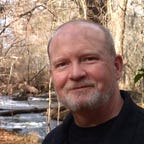ETERNITY DWELLS IN ME
The Faith and Sorrows of Else Lasker-Schüler
In a life of grief, Else Lasker-Schüler was a paradox. The poet, playwright and painter had “a gift for making friends and also for antagonizing them,” quipped her friend Hans Cohn. Else professed visions of the invisible world while insisting that it was no different than the physical reality we experience every day. Her admirers praised her as a mystic; others derided her as mentally unstable. Both may have been right.
Else expressed frustration at the heavy toll exacted by her interaction with the spirit world — emotional, mental and physical. In this she was not unlike Thérèse of Lisieux, who was plagued by headaches, convulsions, shivering and chronic pain. “I would say and do things that I wasn’t thinking,” Thérèse wrote. “I almost always seemed to be delirious, saying words that had no meaning, and nevertheless I’m sure that I wasn’t deprived for a single instant of the use of my reason.”
Some of Else’s behavior seemed equally bizarre to others. A leading figure in the Expressionist movement, she created an alter-ego, dubbed “Prince Jussuf,” dressed exotically, and occasionally spoke in tongues or wrote of communicating with the dead.
Before we judge, however, we may recall that Else was in good company. After all, Jeremiah hid his undergarments and strolled around with a cattle yoke on his shoulders. Some of Else’s eccentricities were due in part to her bohemian lifestyle, placing her closer to King David than many saints we might name. But the poet’s views and behavior were the result of a difficult life.
Born in 1869, Else was deemed a child prodigy at the age of four. Such labels are especially hard on the young, who feel constrained to measure up to impossible expectations. All too soon, grief replaced art as the dominant factor in her life. Else’s brother Paul died when she was thirteen. When she was 21, her mother passed, followed by her father seven years later. Two years after that, in 1899, Else’s son Paul was born.
Young Paul was a child of many gifts. Else saw in him a hope for all that had been blurred and withered in herself: his playfulness, talent and candor were to her a blossom, “a breath from God,” she wrote. The young man’s promise was never to be fulfilled. Paul died at the age of twenty-seven in 1926. Shortly after her son’s death, Else wrote this poem of faith and loss:
TO MY CHILD
You die over and over as
the year passes, my child,
when leaves flow down
and branches grow narrow.
Your taste of death was
bitter: as with red roses,
you were spared no
withering blow.
And so, endless, I weep
in the night of my heart.
Still I sigh the lullabies that
sobbed you into death’s sleep,
and my eyes no longer turn
to the world; the green
of leaves hurts them so.
— yet Eternity dwells in me.
My love for you is the one
image of God permitted us.
Angels wept with me, I saw
them in the wind, in the sleet.
They floated . . .
on the air of heaven.
A moon in bloom is like
your life, my child.
And I dislike the light of carefree
butterflies as they pass.
I did not foresee death
— hunting you, my child.
A Jew in Nazi Germany, Else was subjected to threats and physical abuse. She was awarded the prestigious Kleist Prize for Literature in 1932, but was forced to flee the country less than a year later. Else finally settled in Jerusalem in 1937. She formed a literary salon called “Kraal” that was opened on January 10, 1942 by Martin Buber at the French Cultural Center. Respected author Karl Kraus considered her to be “the greatest poet of modern Germany.” Gottfried Benn, five time nominee for the Nobel Prize in Literature, went a step further, pronouncing Else “the finest lyric poet of the century.”
“To My Child” was published in her last volume of poetry, My Blue Piano (1943). The once famous poet printed only 330 copies of what is often considered her finest work. Else died of a heart attack on January 22, 1944. She was seventy-five, penniless and alone. She rests in the Mount of Olives in Jerusalem.
“I wander!” Else wrote on the last page of My Blue Piano. “My mind flits about like a bird, dear Mother. Yet no one shall rob me of my freedom. If I die on the side of a road, dear Mother, lift me up to the blue of Heaven. I know you are touched by my lonely wavering, and the playful tick-tock of our hearts — mine and my precious son’s.”
NOTES
Text and translations © 2022 David Bannon. All rights reserved. “To My Child” (An Mein Kind) from My Blue Piano (Mein Blaues Klavier); translation © 2022 David Bannon. “I Wander!” (Ich schweife umher!) from My Blue Piano (Mein Blaues Klavier); translation © 2022 David Bannon. “a gift for making friends” and other details of Else’s life are from Your Diamond Dreams Cut Open My Arteries: Poems of Else Lasker-Schüler, UNC Studies in the Germanic Languages and Literatures 100, tr. Robert P. Newton (University of North Carolina Press, 1982). “I would say and do things . . .” Thérèse, de Lisieux, The Story of a Soul: A New Translation, tr. Robert Edmonson (Paraclete Press, 2006).
